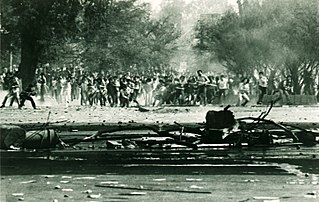
Eduardo Nicanor Frei Montalva was a Chilean political leader. In his long political career, he was Minister of Public Works, president of his Christian Democratic Party, senator, President of the Senate, and the 27th president of Chile from 1964 to 1970. His eldest son, Eduardo Frei Ruiz-Tagle, also became president of Chile (1994–2000).

Carlos Prats González was a Chilean Army officer and politician. He served as a minister in Salvador Allende's government while Commander-in-chief of the Chilean Army. He resigned in August 1973 amid growing national discontent. Immediately after General Augusto Pinochet's September 11, 1973 coup, Prats went into voluntary exile in Argentina. The following year, he and his wife, Sofía Cuthbert, were assassinated in Buenos Aires by a car bomb planted by the Dirección de Inteligencia Nacional.
United States intervention in Chilean politics started during the War of Chilean Independence (1812–1826). The influence of United States in both the economic and the political arenas of Chile has since gradually increased over the last two centuries, and continues to be significant.

Presidential elections were held in Chile on 4 September 1970. Salvador Allende of the Popular Unity alliance won a narrow plurality in a race against independent Jorge Alessandri and Christian Democrat Radomiro Tomic, before having his victory confirmed by a contingent election after the Christian Democrats voted in favour of his candidacy.

Jorge Eduardo Alessandri Rodríguez was the 26th President of Chile from 1958 to 1964, and was the candidate of the Chilean right in the crucial presidential election of 1970, which he lost to Salvador Allende. He was the son of Arturo Alessandri, who was president from 1920 to 1925 and again from 1932 to 1938.

Salvador Allende was the president of Chile from 1970 until his suicide in 1973, and head of the Popular Unity government; he was a Socialist and Marxist elected to the national presidency of a liberal democracy in Latin America. In August 1973 the Chilean Senate declared the Allende administration to be "unlawful," Allende's presidency was ended by a military coup before the end of his term. During Allende's three years, Chile gradually transitioned into a socialist state.

René Schneider Chereau was a Chilean military official who served as commander-in-chief of the Chilean Army at the time of the 1970 Chilean presidential election, when he was assassinated during a botched kidnapping attempt. He coined the doctrine of military-political mutual exclusivity that became known as the Schneider Doctrine.
Roberto Urbano Viaux Marambio was a Chilean Army General and the primary planner of two attempted coups d'état in Chile in 1969 and 1970. The first was against President Eduardo Frei Montalva, and the second sought to prevent Socialist Salvador Allende's election.

El Tanquetazo or El Tancazo was an attempted coup d'état that occurred in Chile on 29 June 1973.

Project FUBELT is the codename for the secret Central Intelligence Agency operations that were to prevent Salvador Allende's rise to power before his confirmation and to promote a military coup in Chile. This project came after the circumstantial failure of Track I, which involved making president Eduardo Frei Montalva interfere with the 1970 national election in opposition to Allende.
Camilo Valenzuela was a Chilean General and chief of the garrison in Santiago de Chile. In 1970 he led a group that with intent to stop the newly elected Salvador Allende from being inaugurated as president, tried to kidnap constitutionalist Army Commander-in-Chief René Schneider.
The Schneider Doctrine was a political doctrine originally espoused by Chilean General René Schneider, which allowed the election of Salvador Allende as President of Chile, and was the main ideological obstacle to a military coup d'état against him. The doctrine was influential through the period July 1970 - September 1973.

Erwin Arturo Frei Bolívar was a Chilean politician who was a senator and presidential candidate in the 1999 election.

The military regime in Chile led by General Augusto Pinochet ended on 11 March 1990 and was replaced by a democratically elected government. The transition period lasted roughly two years, although some aspects of the process lasted significantly longer. Unlike most democratic transitions, led by either the elite or the people, Chile's democratic transition process is known as an intermediate transition – a transition involving both the regime and the civil society. Throughout the transition, though the regime increased repressive violence, it simultaneously supported liberalization – progressively strengthening democratic institutions and gradually weakening those of the military.

The Ariostazo occurred on August 25, 1939, and was a brief revolt of the Tacna artillery regiment, led by General Ariosto Herrera, in what turned out to be a non-violent attempt against the government of Chilean President Pedro Aguirre Cerda.
Eduardo Frei Montalva, President of Chile, was as an opposition leader against the government of President Salvador Allende and initially supported the Chilean coup of 1973 that deposed Allende and established the military dictatorship of Augusto Pinochet. Frei Montalva died in 1982 apparently following routine surgery.

Following the 1973 Chilean coup d'état, an armed leftist resistance movement against Augusto Pinochet's dictatorship developed until 1990 when democracy was restored. This conflict was part of the South American theater in the Cold War, with the United States backing the Chilean military and the Soviet Union backing the guerrillas. The main armed resistance groups of the period were the Revolutionary Left Movement (MIR) and Frente Patriótico Manuel Rodríguez (FPMR), the armed wing of the Communist Party of Chile. These groups had a long-standing rivalry, including over Marxist orthodoxy and its implementation.
Events in the year 1973 in Chile.
The following lists events that happened during 1970 in Chile.
Nationalist Liberation Offensive was a fascist Chilean political movement led by the terrorist Enrique Arancibia Clavel. It operated between 1969 and October 1970 through means of political violence and sabotage against the government of Christian Democrat Eduardo Frei Montalva and Socialist Salvador Allende Gossens.










